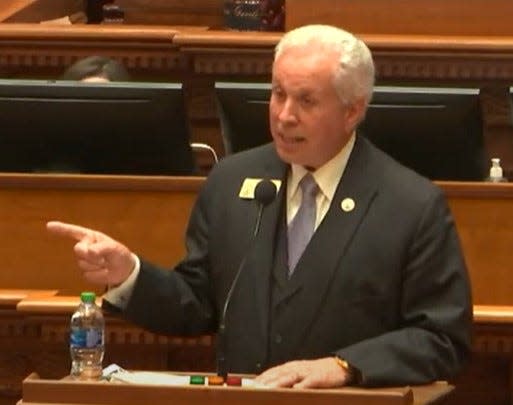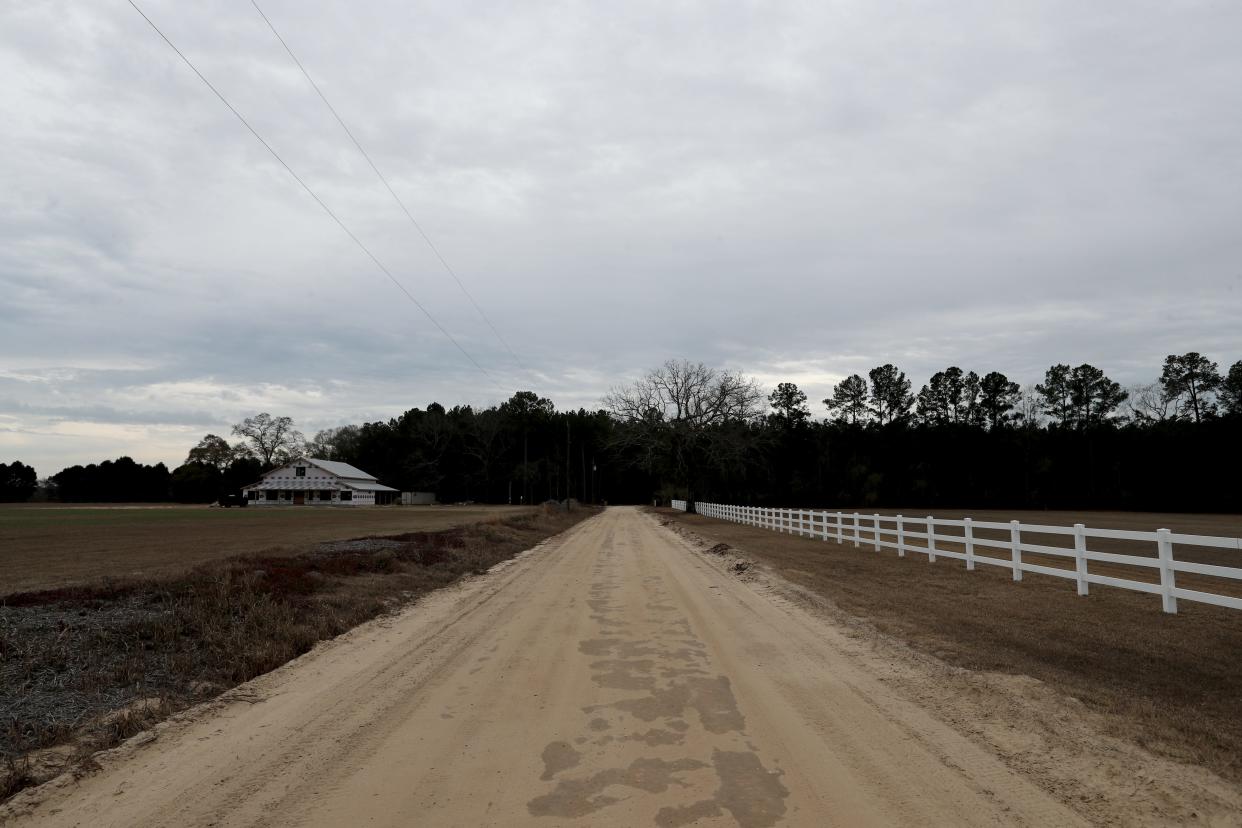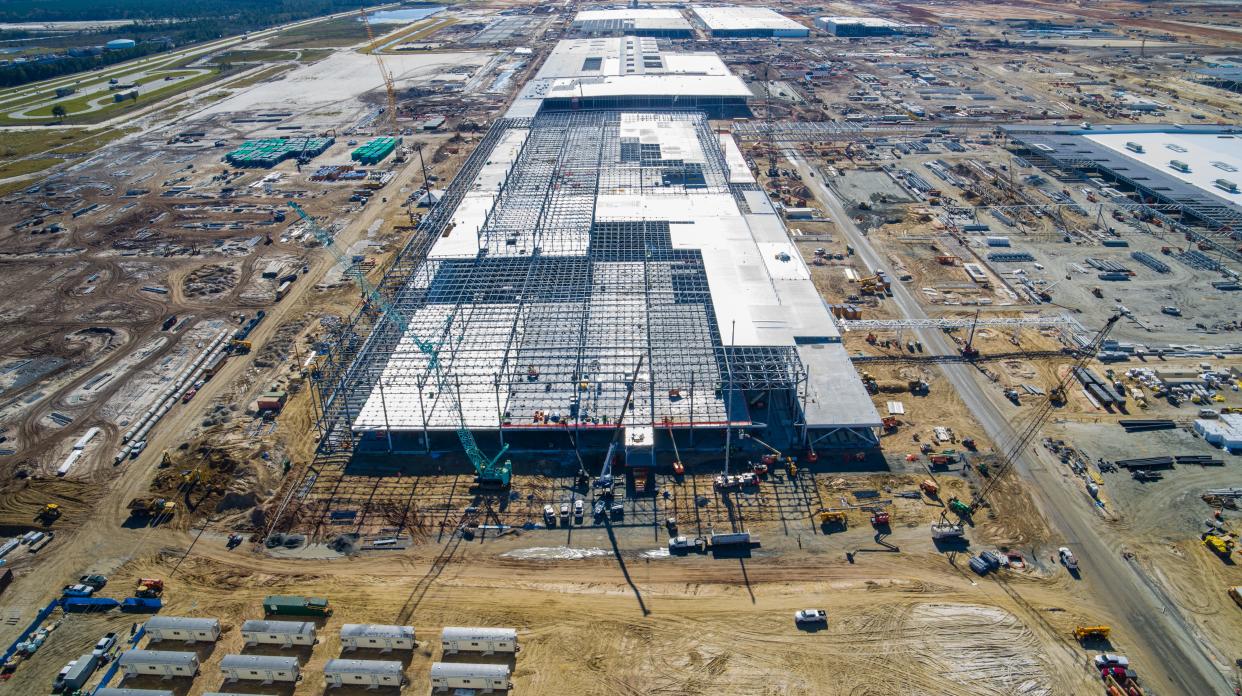Stephens makes fact-challenged case for HB 1146 to enable private water utilities in state

On Leap Day, Georgia Rep. Ron Stephens took to the House floor to deliver an impassioned pitch for proposed legislation he insisted is “a must” for his coastal district.
The Savannah Republican, who serves as chairman of the House Economic Development and Tourism Committee, referenced the state’s success in convincing Hyundai to build a $5.5 billion electric-vehicle factory west of Savannah – by far the largest investment of its kind in Georgia.
He noted that the effort included offering a 3,000-acre site close to the Port of Savannah, more than $2 billion in potential incentives and a plan for four wells to supply more than 6.6 million gallons of water per day to the Bryan County complex, which is expected to begin production later this year.
“All of this stuff was worked out, except one little thing,” he explained. “Workforce housing.”
Hyundai has committed to employing 8,000 workers in an exploding region of Georgia with an already-tight housing market, so new and affordable residential development is imperative.
But the effort is off to a rough start, a grim-faced Stephens told his colleagues.
“We’ve already had our first (workforce housing) casualty before they opened,” he lamented before asking that a front-page image from the Feb. 28 issue of the Savannah Morning News be projected on a screen in the chamber.
The paper’s lead story referenced a decision by developer James Dasher of Fetzer Lakes LLC to shelve a proposed 500-home subdivision in Pembroke, near the Hyundai site.
“The problem is that (Bryan) County doesn’t have one drop of a water withdrawal permit,” Stephens said before explaining why his House Bill 1146 would prevent such impasses by allowing a private utility to step in if a local government was not able to supply a subdivision. “Ladies and gentlemen, this company Fetzer backed out yesterday. They couldn’t get water from the county.”
What a predicament, he lamented. A developer, ready to deliver reasonably priced homes the area desperately needs, thwarted by a lack of available water.
Except that’s not the way it happened at all.
Water uncertainty: Four wells might not be enough for Hyundai's Savannah-area factory, state says
Council members 'weren't ready to move forward'
Water – or a lack thereof – had no role in Dasher’s decision. Nor would it have prevented him from completing the project if it had been approved, as Stephens claimed in the crux of his pitch.
In discussing his decision with another SMN reporter, Dasher explained that after working with city staff members for a year to refine the project, he suspected that council members “weren’t ready to move forward with a project of this magnitude” because of backlash from the community.
“The general public doesn't realize what has taken place to get to this point,” Dasher added.
On the House floor, Stephens acknowledged Dasher’s determination and sympathized with his plight.
“They even tried to annex (the site) into the city to supply water from the county,” he said incredulously. “With all the roadblocks, (Dasher) spent over $400,000 to try to get water for this workforce housing.”
But again, Stephens’ description didn’t square with reality.
Indeed, the plan was to annex the tract into Pembroke, but that was so the city – not Bryan County – could extend water and sewer lines at Dasher’s expense to serve the 500 homes.

City Manager Chris Benson confirmed Friday that Pembroke has adequate permitted water capacity to serve the development and is in the process of expanding sewer service to the area.
It’s a crucial distinction because, as Stephen accurately noted, Bryan County does not have available capacity tied to its state water permit.
Bryan – along with Chatham and a portion of Effingham counties – is subject to caps on what it can take from the Floridan Aquifer.
The Georgia Environmental Protection Division set the limits in 2013 after an investigation determined the Savannah area’s overuse of the aquafer was largely to blame for saltwater intrusion of the Floridan, which in turn was negatively affecting Hilton Head Island’s water supply.
A 97-million-gallon freshwater reservoir built as part of the Savannah River harbor deepening project was completed in 2018, providing an additional water source for the area. But limits on aquifer access remain, and Bryan has actually surpassed its threshold, according to data shared by EPD recently.
That’s why four proposed aquifer wells that would supply as much as 6.6 million gallons of water per day to Hyundai’s electric-vehicle plant would be drilled in neighboring Bulloch County.
In its draft permit for those wells, EPD “strongly encourages” both counties to work with the state to identify and connect to new sources of surface water to accommodate growth without further stressing the Floridan aquifer.
Supporters consider HB 1146 a bridge for drinking water in northern Bryan County as those efforts proceed, and as the need to house Hyundai employees multiplies.
‘Win some ... lose some’:: Developer details withdrawal of proposed Pembroke development
'Nowhere near that capacity'
The primary benefactor of the legislation would be Savannah-based company Water Utility Management, which serves 32,000 homes in 17 Georgia counties. That includes 5,000 customers in Bryan County and 1,000 within 5 miles of the Hyundai complex – with the potential for considerably more.
Water Utility Management CEO Mark Smith, also chairman of the board for the Savannah Convention Center, says his company has the capacity to bring water service to 3,000 homes near the plant.
Additional county sources “are likely years away,” he added. “And so, we have the immediate ability to provide water services in that area with our groundwater permits.”
Meanwhile, environmental groups have united in opposition to HB 1146.
“This bill would allow private water providers throughout the state to outcompete public water utilities, bypass local government planning, ignore affordable housing designs and sell access to our drinking water supply to the highest bidder,” said Megan Desrosiers, CEO of the organization One Hundred Miles.

Critics also argue that adding water service without corresponding sewer expansion is not just poor planning, but also sets the county up for a potential flood of new septic systems, which typically serve larger lots with bigger, more-expensive homes.
That won’t be a problem, Rep. Stephens insisted during his Feb. 29 floor speech as he pointed to a satellite image of northern Bryan County projected on the screen.
“You see the yellow spot up there?” he asked. “That's 500,000 gallons a day of wastewater treatment from a private system waiting to (serve) these homes.”
But again, a fact check called Stephens’ claim into question.
“We’re nowhere near that capacity,” said Anthony Abbott who, along with other residents of The Lakes subdivision, owns the treatment facility Stephens referenced. “We could be someday, but that will take a lot of time, money and expansion. We might never get there.”
Abbott would not reveal how much the facility is handling now but did say treated wastewater is being sprayed on 30 acres of hay fields. That’s about one-fourth of what the company, Consolidated Utilities, has available for spraying, he said.
Mark Woodall, Georgia legislative chair for the Sierra Club, suggested that Stephens’ fact-challenged rationale for his bill dovetails with a growing trend in the General Assembly.
“They say around the Capitol that it's not a lie if you can make it stick until the end of the session,” he said.
Following Stephens’ appeal, the House approved HB 1146 and sent it to the Senate, where it is scheduled to be discussed Tuesday in the Natural Resources and Environment Committee.
John Deem covers climate change and the environment in coastal Georgia. He can be reached at jdeem@gannett.com
This article originally appeared on Savannah Morning News: Georgia legislator pushes private water utilities with false claims
